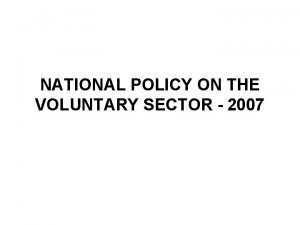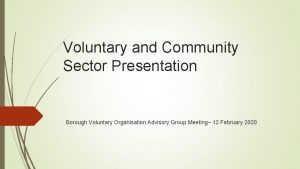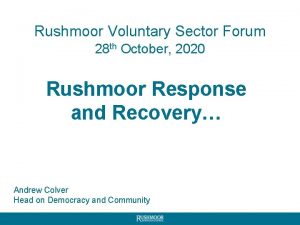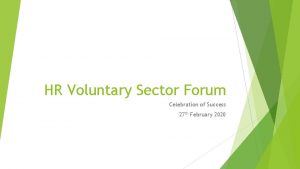HR Voluntary Sector Forum Retention in the Voluntary













- Slides: 13

HR Voluntary Sector Forum Retention in the Voluntary Sector Victoria Knox 2 nd May 2019

Background ü Perceived challenges in Social Care ü Anecdotal information ü 2016 Benchmarking report – ranges in retention up to 35% ü 2016 Scottish Government Report - 79% experienced difficulty, either regularly or occasionally, in retaining care or support workers ü Some of the main factors: ü Competition from other sectors / Pay & conditions ü Antisocial hours / Workload ü Registration / qualification ü Management & leadership ü Training & development ü Retention Pilot January 2017

Project Scope April 2017 – March 2018 ü Benchmarking ü Track reasons ü Track movements ü Develop processes ü Analysis of information ü Consideration of retention strategies ü Consider longitudinal study

Benefits üUse as a best practice example Collaborative working üConsistency across the sector üImproved reporting to Board/Mgt Teams üUse of data as a sector üGeneration of accurate data as opposed to anecdotal data

The Pilot ü 8 voluntary sector organisations = total w/f 7, 500 approx. ü CCPS / Strathclyde University ü Standardised exit interview template ü Mapped to Scottish Government report ü Agreed to include relief/sessional staff ü Conducted a 6 month review

Key Findings Leavers ü 66% female ü Highest proportion from the East of Scotland (29%) ü Majority (36%) 3+ years service ü Lowest proportion (9%) 0 -3 months service ü 26% left the sector ü 55% FT, 32% PT, 8% Relief ü 84% enjoyed their job – only 7% did not ü 73% enjoyed working for their org – only 13% did not ü 60% would consider re-employment

Key Findings Relationship measures ü 79% believe managers communicate and follow policy and practice ü 59% stated that managers respond to issues promptly But ü Relational issues exist ü inconsistencies in the treatment of staff, approachability, trustworthiness and ability to listen characterised negative evaluations of line managers and supervisor performance

Key findings + “Working with service users and other staff and stakeholders. Great sense of job satisfaction, sense of making a difference. Role of liaison worker and speak out as I felt I was empowering service users. ” “Genuine sense that the work we do is valuable and effective. Direct work with service users. ” “Being able to make a difference to people's lives. Using focused work to effect change. ”

Key findings “No longer "person centred" more "money centred“ “Volume of work can impact on job satisfaction” “I felt I was not supported & none of the issues have ever been resolved” “Difficult to strike a balance between support and office workload often felt pulled between the two roles”

Top Reasons for Leaving ü Other – retirement, change of career, end of contract, lack of support, other responsibilities - such as education and personal circumstances ü Working hours. ü Lack of career progression. ü Salary ü Relationship with line manager ü Lack of job satisfaction ü Morale within the team

Recommendations ü Reforms to job design: reasonable hours for front-line in terms of pattern and length of shifts ü Evaluation of career paths and opportunities for progression ü Importance of supervision ü Develop supervisors and line managers in areas such as communication, coaching and team building ü Awareness of the balance of Managers’ scope of work and responsibility against having adequate people management time ü Voice of the worker: needs to be heard! ü Policy forum to develop guidance on good practise. ü Continue to collate data and analyse

Thank You ü Ian Cunningham, Joanna Butler and Dora Scholarios - Department of Work, Employment and Organisation, University of Strathclyde ü Participating Organisations ü CCPS

Questions ?
 Direct voluntary action
Direct voluntary action National policy on the voluntary sector 2007
National policy on the voluntary sector 2007 Thiếu nhi thế giới liên hoan
Thiếu nhi thế giới liên hoan Fecboak
Fecboak Hát lên người ơi alleluia
Hát lên người ơi alleluia điện thế nghỉ
điện thế nghỉ Một số thể thơ truyền thống
Một số thể thơ truyền thống Hệ hô hấp
Hệ hô hấp Số nguyên tố là gì
Số nguyên tố là gì Cong thức tính động năng
Cong thức tính động năng Tỉ lệ cơ thể trẻ em
Tỉ lệ cơ thể trẻ em đặc điểm cơ thể của người tối cổ
đặc điểm cơ thể của người tối cổ Các châu lục và đại dương trên thế giới
Các châu lục và đại dương trên thế giới ưu thế lai là gì
ưu thế lai là gì

























